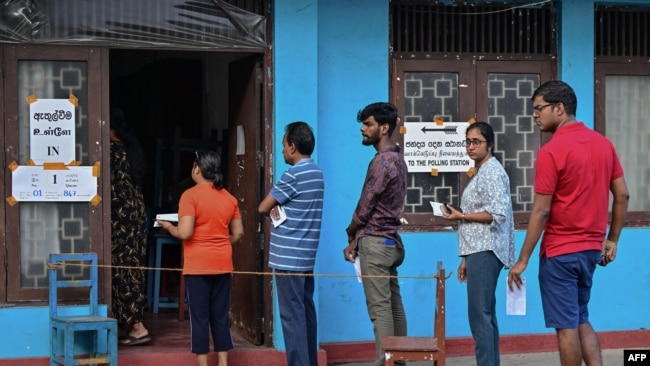Sri Lankan president hopes to ramp up support in parliamentary elections
Posted on November 14th, 2024
Courtesy VOA
New Delhi —
Millions of Sri Lankans voted Thursday to choose a new parliament in a key election that will decide if the country’s new leftist president gets the mandate to push ahead with his agenda of improving lives for millions of people struggling with an economic downturn and stamping out corruption.
President Anura Kumara Dissanayake swept to power in September on his promise of systemic change in a country where public anger with mainstream political parties has been running high since the country’s crushing economic collapse two years ago.
Hoping to build on the widespread support he secured in the presidential election, he dissolved parliament and ordered snap polls about a year ahead of schedule. Dissanayake’s party, a fringe group, held only three seats in the 225-member parliament.
His coalition, the National People’s Power (NPP) is likely to win a majority, according to political analysts.
Normally in this country the presidential winner gets enough parliamentary backing to enable him to govern,” Paikiasothy Saravanamuttu, Executive Director of the Center for Policy Alternatives in Colombo, told VOA. Getting to the half-way mark, that is 113 seats, is crucial because he needs a majority to implement his program.”
About 17 million people were eligible to choose from about 8,800 candidates.
Many of the candidates contesting from the NPP are newcomers to politics. Some analysts say that is an advantage because they are not tainted by corruption in a country that has rejected traditional parties, blaming established politicians for a corrupt culture. Others point out that because they are mostly unknown faces, much will depend on whether President Dissanayake, a charismatic leader, was able to convince voters to back them.
Parliament needs more NPP members to establish a strong government which will eliminate bribery and corruption,” the Sri Lankan leader said in his final public meeting before the polls.
Although Dissanayake was a member of parliament for 25 years, his party, the JVP or People’s Liberation Front, was a fringe group on the margins of Sri Lanka’s politics. In the runup to the presidential polls, the 55-year-old leader put together a coalition that consists of members of his party, professionals, civil society organizations, women and youth groups.

Public expectations in the country ran high as people headed out to vote on Thursday. Melanie Gunathilaka, a Colombo resident, who voted soon after polls opened, said she is optimistic the elections will pave the way for the change that many Sri Lankans are yearning for.
There was a lot of resentment among people like us about the misuse of state funds and mismanagement by the established parties,” she told VOA. We hope the new government will reflect a political culture that is rooted in transparency and accountability.”
The main challenger to Dissanayake’s coalition NPP, is the Samagi Jana Balawegaya, led by opposition leader Sajith Premadasa. The New Democratic Front (NDF), backed by former president Ranil Wickremesinghe, is also in the fray.
But the opposition campaign in the runup to the parliamentary polls was low-key. The opposition is in disarray, so the sense of a contest is not there. Only the NPP has held big rallies,” according to Saravanamuttu.
Voters directly elect 196 members of parliament, while the remaining 29 seats are allocated according to the proportional vote obtained by each party. Tens of thousands of security personnel were deployed at the more than 13,000 polling stations set up across the island country, at schools, temples and other public places.
The outcome of Thursday’s polls will be important in determining how smoothly Dissanayake is able to implement reforms he has promised, such as cutting taxes and supporting small businesses. His first task will be to appoint a full-fledged cabinet. At the moment he only has a prime minister and two ministers.
He backs policies that will ease hardship for working class people and has said that he will renegotiate the terms of a $2.9 billion bailout from the International Monetary Fund, while sticking with the program. While the IMF package helped stabilize the country’s economy, subsidies were slashed as part of austerity measures imposed by the IMF. Since the economic collapse, millions have fallen into poverty, food and fuel prices have skyrocketed and citizens say there are fewer job opportunities.